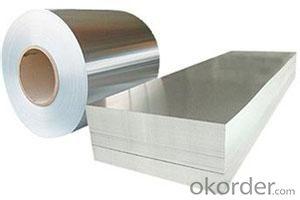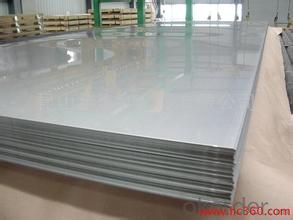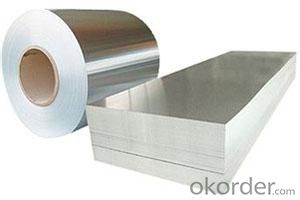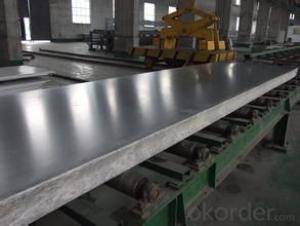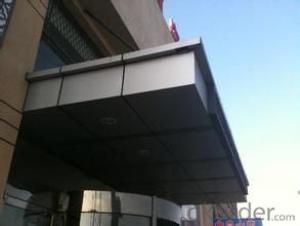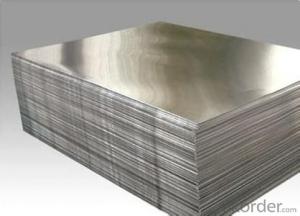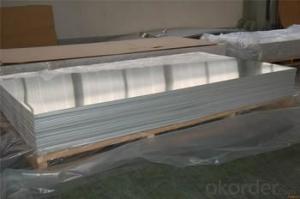Bendable Aluminum Sheets - Wholesale Aluminum Mill-Finished Panel in China
- Loading Port:
- China Main Port
- Payment Terms:
- TT OR LC
- Min Order Qty:
- -
- Supply Capability:
- -
OKorder Service Pledge
OKorder Financial Service
You Might Also Like
Aluminium is a relatively soft,durable, lightweight, ductile and malleablemetal with appearance ranging from silvery to dull gray,depending on the surface roughness. It is nonmagnetic and does not easilyignite. A fresh film of aluminium serves as a good reflector (approximately92%) of visible light and an excellent reflector (as much as98%) of medium and far infrared radiation. The yield strength of pure aluminium is 7–11 MPa,while aluminium alloys have yield strengths ranging from200 MPa to 600 MPa. Aluminium has about one-third the density and stiffnessof steel. It iseasily machined,cast, drawn and extruded.
Alu Plate
Alloy: AA1050, 1060, 1100, AA3003, 3005, 3015, 5052, 5754, 5083,8011,etc
Temper:H14/16/18/22/24/32,HO etc.
Thickness:0.2mm—100mm
Width:100mm—2300mm (Can be slitted)
Application: Foil stock, Circles, Roofing, Canstock, Marine plate,Anti-sliperypurpose in vehicles, packing and appliance.
- Q: Can aluminum sheets be used for solar reflectors?
- Yes, aluminum sheets can be used for solar reflectors. Aluminum has a high reflectivity, meaning it can effectively reflect sunlight and reduce heat absorption. This makes it an ideal material for solar reflectors, which redirect and concentrate sunlight onto solar cells or other energy-absorbing devices.
- Q: To rephrase- in our physics class we found that a simple bar magnet wouldn't attract to an aluminum gutter nail, but our teacher told us to find out whether or not any magnet could lift up the aluminum material. If you answer please give a reference or source, or at least an idea on how to go about researching this, all help appreciated, thanks and God Bless!
- Aluminum Magnet
- Q: Dear all, i'm having crack problem with bending aluminium sheet metal, anyone know than which type(Model) of aluminium sheet metal is suitable for bending, Thanks.
- THERE WERE MANY TYPES OF ALUMINUM ACCORDING TO ITS RIGIDITY. Please refer to RS Industrial catalogue for your data references.
- Q: Can aluminum sheet be used for reflective surfaces?
- Yes, aluminum sheet can be used for reflective surfaces.
- Q: What is the composition of 101 aluminum sheets?
- The term "composition of 101 aluminum sheets" generally pertains to the alloy employed during their production. Aluminum alloy 101, on the other hand, is an aluminum that is commercially pure, with a minimum aluminum content of 99.0%. It lacks substantial quantities of other elements, thereby representing the most fundamental and uncontaminated form of aluminum accessible. This exceptional level of purity grants it remarkable resistance against corrosion and excellent electrical conductivity. When a high level of electrical conductivity or corrosion resistance is necessary, 101 aluminum sheets are frequently implemented in various applications such as electrical wiring, heat exchangers, and chemical processing equipment.
- Q: What are the different methods of cutting aluminum sheets?
- To cut aluminum sheets, one can utilize various methods based on specific requirements and material thickness. Some commonly employed techniques include: 1. Shearing: By means of a shearing machine, straight lines can be cut in the aluminum sheet. The machine applies force to a blade, resulting in material separation. Shearing is a swift and efficient approach, especially suitable for thinner gauges. 2. Sawing: For cutting aluminum sheets, circular or bandsaws equipped with specialized metal-cutting blades are commonly employed. This method allows for greater precision and controlled cuts, making it ideal for thicker sheets. 3. Laser cutting: This highly precise and efficient technique employs a concentrated beam of light to melt and vaporize the aluminum, resulting in a clean and smooth cut. Laser cutting is particularly advantageous for intricate designs and complex shapes. 4. Waterjet cutting: This method involves the use of a high-pressure stream of water mixed with abrasive particles to cut through aluminum sheets. It is applicable to various thicknesses and allows for precise cuts without generating heat. Waterjet cutting is often preferred for thicker sheets or when high precision is required. 5. Plasma cutting: By employing a high-temperature plasma torch, aluminum sheets can be melted and cut. The torch generates an electric arc, ionizing the gas and creating a plasma state. Although versatile and capable of cutting through different thicknesses, plasma cutting may yield rougher edges in comparison to laser or waterjet cutting. When selecting the most suitable method for cutting aluminum sheets, it is crucial to consider project-specific requirements such as desired cut quality, speed, and complexity.
- Q: Are aluminum sheets suitable for medical equipment?
- Yes, aluminum sheets are suitable for medical equipment. They are lightweight, durable, and have high corrosion resistance, making them ideal for various medical applications such as surgical instruments, diagnostic equipment, and prosthetics.
- Q: Can the aluminum sheets be used for reflector applications?
- Indeed, reflector applications can make use of aluminum sheets. Renowned for its remarkable reflectivity, aluminum stands out as an optimal material for reflectors across different industries. With a reflectivity of approximately 90% for visible light and a staggering 95% for infrared radiation, aluminum sheets possess a flawlessly smooth surface that facilitates efficient reflection of both light and heat. This outstanding feature renders them highly suitable for an array of applications, including automotive headlights, solar reflectors, lighting fixtures, and optical instruments. Moreover, aluminum boasts a lightweight composition, corrosion-resistant properties, and exceptional thermal conductivity, further enhancing its suitability for various reflector applications.
- Q: Can aluminum sheets be used for decorative wall panels?
- Aluminum sheets are indeed suitable for decorative wall panels. As a versatile material, aluminum offers a wide array of design options for wall panels. It is lightweight, durable, and resistant to corrosion, making it perfect for both indoor and outdoor applications. Aluminum sheets can be easily cut, formed, and fabricated into various shapes, patterns, and finishes, allowing for limitless design possibilities. Moreover, aluminum can be enhanced in appearance and provided with extra protection against wear and tear through powder-coating or anodizing. Whether it's for residential or commercial spaces, aluminum sheets can impart a modern and stylish touch to any wall, rendering them a highly sought-after choice for decorative wall panels.
- Q: What is the typical thermal conductivity of aluminum sheets?
- Aluminum sheets usually exhibit a thermal conductivity ranging from 205 to 230 watts per meter-kelvin (W/mK). Thanks to this remarkable thermal conductivity, aluminum serves as an exceptional conductor of heat. Hence, it finds widespread usage in various applications that prioritize efficient heat transfer, including heat sinks, power transmission lines, and cooking utensils.
Send your message to us
Bendable Aluminum Sheets - Wholesale Aluminum Mill-Finished Panel in China
- Loading Port:
- China Main Port
- Payment Terms:
- TT OR LC
- Min Order Qty:
- -
- Supply Capability:
- -
OKorder Service Pledge
OKorder Financial Service
Similar products
Hot products
Hot Searches
Related keywords

